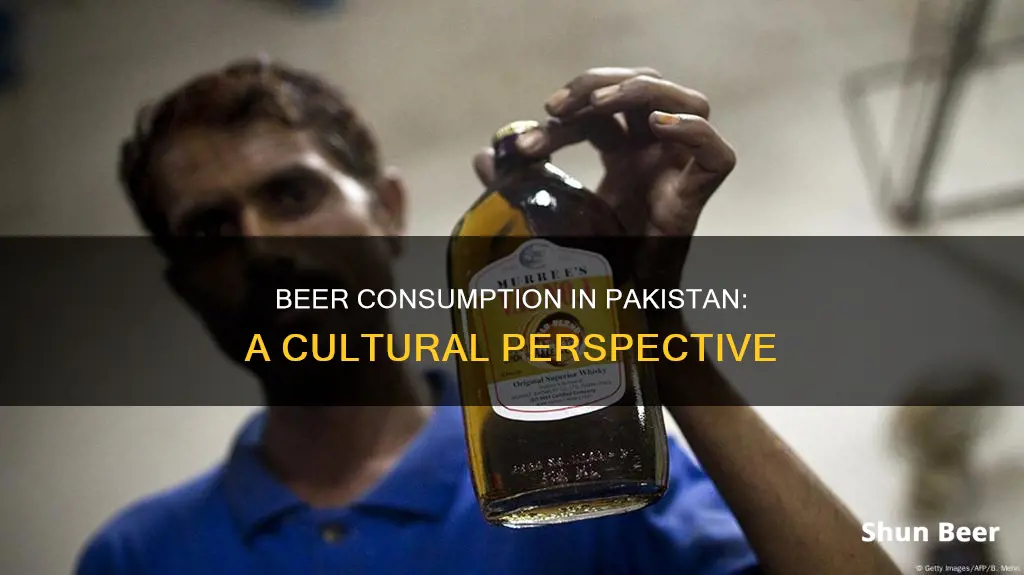
Pakistan has strict laws surrounding the consumption of alcohol, with drinking in public being frowned upon and advertising for alcoholic beverages outlawed. Since the mid-1970s, alcohol has been banned for Muslim citizens, who make up around 97% of the population. However, non-Muslims can consume alcohol after obtaining a government license, and some hotels are licensed to serve alcohol to non-Muslim foreigners. Despite the restrictions, alcohol is still consumed in Pakistan, with a black market and bootleggers providing access to those who want it. While drinking culture varies across the country, it is generally more common in the middle and upper classes and among men, with many conservative families abstaining altogether.
| Characteristics | Values |
|---|---|
| Alcohol laws in Pakistan | Since the mid-1970s, alcohol has been banned for Muslim citizens, who make up around 97% of the population. |
| Non-Muslims and alcohol | The remaining 3% (mostly Christians) can buy alcohol with a permit. Foreigners can also apply for alcohol permits. |
| Availability of alcohol | Alcohol is served to non-Muslims at restaurants in five-star hotels. It can also be purchased at small shops within these hotels. |
| Bootlegging | Alcohol can be obtained illegally through bootleggers or the black market. |
| Drinking culture | Drinking is done in private and is more common among the middle and upper classes. |
| Social stigma | Drinking may lead to social stigma and judgement, especially in conservative families. |
| Homemade alcohol | Homemade alcohol, often made with methyl alcohol, is dangerous and has caused many deaths and injuries. |
What You'll Learn

Beer and liquor are more common than wine in Pakistan
Pakistan has a complex relationship with alcohol. With a majority Muslim population, alcohol is banned for Muslims in the country, and advertising for alcoholic beverages is outlawed. This means that, officially, only 3% of the population (mostly Christians) are permitted to buy alcohol. However, in practice, alcohol is available and consumed in Pakistan, albeit in private rather than in public.
For those who can access it, beer and liquor are the most common alcoholic drinks in Pakistan. Wine, while not unheard of, is less popular. This may be due in part to the higher cost of alcohol in the country, which tends to limit social drinking to the middle and upper classes.
The availability of alcohol in Pakistan is something of an open secret. While it is not served in restaurants or at most social events, it is possible for non-Muslims to obtain alcohol licences and purchase alcohol from certain shops and hotels. Some people also obtain alcohol through the black market or by using bootleggers, who will deliver alcohol to your home.
The consumption of alcohol in Pakistan is a somewhat controversial issue. While many people do drink, often in private or at house parties, there is also a significant portion of the population that abstains from alcohol completely due to religious or cultural reasons. As a result, drinking tends to be a private rather than a public activity, and those who do drink may face social stigma and judgement.
Despite the legal restrictions and social stigma surrounding alcohol in Pakistan, it is clear that beer and liquor are more commonly consumed than wine. This may be due to a variety of factors, including cultural preferences, availability, and the higher cost of wine relative to other alcoholic beverages.
Understanding Beer Columns: Brewing Process Simplified
You may want to see also

Drinking is done in private
Drinking alcohol in Pakistan is done in private rather than in public. Although the country's laws ban Muslims from consuming alcohol, many people do drink in private. Some sources suggest that drinking is common at weddings and parties, especially among the middle and upper classes. However, others claim that it is not that common and that many conservative families do not drink at all.
One source mentions that drinking tends to be limited to the men in the family in public, while drunkenness tends to occur at private house parties. Another source mentions that alcohol is often consumed at weddings, but only in the men's section. It is worth noting that Pakistan's laws banning Muslim citizens from consuming alcohol are not always strictly enforced, and some people find ways to obtain alcohol illegally.
The social stigma surrounding alcohol consumption in Pakistan is strong, and those who drink may face judgement and criticism. This is especially true for women, who are generally not expected to drink in Pakistani culture. However, it is important to note that alcohol consumption is not limited to a particular class or social group, and people from all walks of life may engage in drinking.
Obtaining alcohol in Pakistan can be challenging, especially for those who do not have connections or access to the black market. Some people may resort to buying local homemade brew from illegal brewers, but this can be dangerous as it is often made with methyl alcohol and tainted with chemicals, leading to deaths and serious illnesses. For those who can afford it, "bootleggers" or illegal delivery services are an option, but this can be expensive.
Overall, while drinking alcohol in Pakistan is done in private, it is not uncommon, and those who wish to consume alcohol can usually find a way to obtain it. However, it is important to be discreet and aware of the social and legal consequences that may arise from drinking in a country with strict laws and cultural norms surrounding alcohol consumption.
Beer and Tamiflu: Is It Safe to Drink?
You may want to see also

Alcohol is expensive, so social drinking is limited to the middle and upper classes
Pakistan has prohibited the sale of alcoholic beverages to Muslim citizens since the mid-1970s, when the then-ruling Bhutto government introduced the ban. This means that the majority Muslim population, which makes up around 97% of the country, cannot legally buy alcohol. The remaining 3% of the population, mostly Christians, can obtain a permit to buy alcohol. This system effectively limits social drinking to the middle and upper classes.
Alcohol is expensive in Pakistan, with beer and liquor being the most common drinks. A bottle of domestic beer costs around Rs. 150-200 ($1.75-$2.35), while a bottle of imported Heineken costs Rs. 500 ($5.80). Domestic vodka costs around Rs. 700 ($8.15). These prices are for authorised dealers, and prices from bootleggers may be higher due to delivery charges.
The high cost of alcohol means that social drinking is largely limited to the middle and upper classes. In addition, many conservative families do not drink at all, and men are more likely to drink publicly than women. Drinking is generally done in private rather than in public, and drunkenness is usually confined to private house parties.
While alcohol is legally served to non-Muslims at restaurants in five-star hotels, the sole authorised bar in the country is located in the Pearl Continental Hotel in Peshwar. The Murree brewery is the only legal distillery in Pakistan and has a cult following in the US.
For those who can afford it, there are ways to obtain alcohol in Pakistan, whether through legal means, the black market, or bootleggers. However, the high cost of alcohol means that social drinking is largely limited to the middle and upper classes.
The Magical Math of 79 Beers: Age Subtraction Mystery
You may want to see also

Non-Muslims can get a license to drink
Pakistan is an officially 'dry' country, with the sale of alcoholic beverages prohibited for Muslims, who make up around 97% of the population. However, non-Muslims, who account for the remaining 3%, are permitted to consume alcohol after obtaining a license from the government. This unique licensing system is the only one of its kind globally, making Pakistan stand out in terms of its alcohol regulations.
The process of obtaining a license involves applying at the office of Excise and Taxation in sector F8 Islamabad. While it is technically required, some foreigners may be able to purchase alcohol without one. However, for those planning an extended stay in the country, obtaining the license is recommended to facilitate regular alcohol consumption. It is worth noting that non-Muslim foreigners are also allowed to order alcohol in some hotels and restaurants with liquor licenses without a license.
The license permits the holder to purchase a limited quantity of alcohol, typically up to 100 bottles of beer or 5 bottles of liquor per month. However, these limits are not always strictly enforced. The alcohol can be purchased at specialty shops, typically located in the back of five-star hotels, which operate only during specific hours and remain closed on Fridays.
It is important to note that drinking in Pakistan is generally done in private rather than in public. While alcohol is available, the culture surrounding its consumption is relatively conservative. Additionally, during the Muslim month of Ramadan, the rules are more strictly enforced, and even non-Muslims are expected to refrain from eating or drinking in public during the day.
The availability of alcohol in Pakistan is primarily limited to the middle and upper classes due to the high cost of alcoholic beverages. The drinking culture is also largely male-dominated, with men more likely to drink publicly than women. Nevertheless, it is not uncommon for well-stocked liquor cabinets to be found in private homes, and social drinking does occur at private house parties.
Cuban Beer Culture: Exploring Cuban Drinking Preferences
You may want to see also

Drinking laws are more strictly enforced during Ramadan
Pakistan has strict laws regarding alcohol consumption, with drinking and buying alcohol prohibited for its majority Muslim citizens (approximately 97% of the population). Non-Muslims, who make up 3% of the population, are permitted to buy alcohol with a special license. The country's alcohol laws are more strictly enforced during the Muslim holy month of Ramadan, when everyone, including non-Muslims, is expected to refrain from eating and drinking in public during daylight hours.
During Ramadan, the Pakistani government upholds a 34-year-old law that requires Muslims to abstain from eating and drinking in public. This law, Ehtiram-e-Ramadan (Respect for Ramadan), was introduced in 1981 by the military dictator Zia-ul-Haq. It prescribes punishments of up to three months in jail and fines for those who violate the fasting rules. Even before the law was enacted, it was considered unacceptable to eat or drink in public during Ramadan.
The restrictions during Ramadan extend beyond legal consequences. Social expectations and pressure play a significant role in enforcing the fasting rules. Religious scholar Abdul Qudoos Muhammadi advises non-fasters to "behave as if they were fasting" and to "avoid eating or drinking openly" out of respect for those who are observing the fast. This sentiment is echoed by Zia Ahmed, a small trader in Karachi, who believes that everyone in Pakistan, regardless of their religious affiliation, must respect Ramadan and its rules.
The strict enforcement of drinking laws during Ramadan in Pakistan reflects the country's cultural and religious norms. It is important to note that these norms are not universally accepted, and there are individuals who criticise the restrictions as a violation of fundamental human rights. Nonetheless, the combination of legal repercussions and social expectations ensures that drinking laws are stringently observed during the holy month.
While the focus is primarily on refraining from eating and drinking during daylight hours, the sale and consumption of alcohol may be further restricted during Ramadan. Some sources indicate that alcohol sales are banned in certain places, such as hospital cafeterias, which may remain open during Ramadan to serve non-fasters. Additionally, individuals who consume alcohol may choose to abstain from drinking for the duration of Ramadan, further reducing the availability and consumption of alcohol during this period.
Old Beer: Is It Safe to Drink After a Year?
You may want to see also
Frequently asked questions
Yes, since the mid-1970s, Muslims in Pakistan have been prohibited from buying alcohol. This applies to the majority Muslim population, which makes up roughly 97% of Pakistan's population.
Non-Muslims can obtain alcohol by getting a license from the government. They can also order alcohol in some hotels and restaurants within five-star hotels.
Drinking is done in private rather than in public. Beer and liquor are more common than wine, and alcohol is generally expensive, so social drinking is mostly limited to the middle and upper classes.
If you want alcohol in Pakistan, you will likely be able to find a way to get it. Many people drink alcohol in private and some have well-stocked liquor cabinets in their homes. However, there is a social stigma and judgement associated with drinking, and many conservative families do not drink at all.







